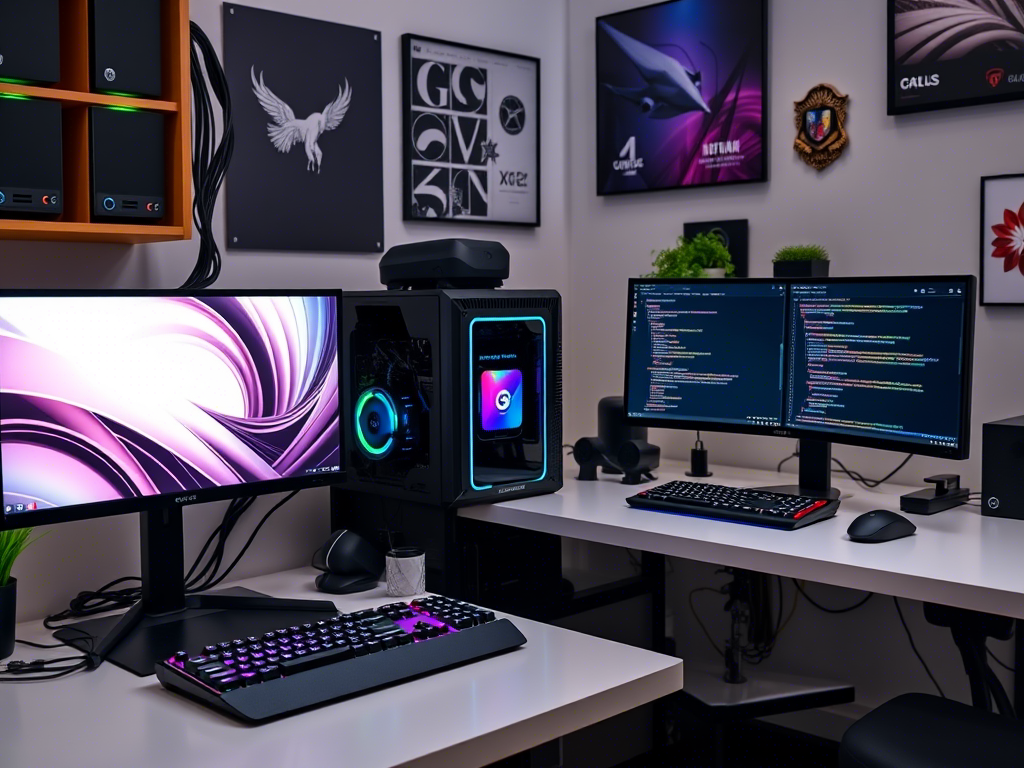If you’re looking to optimize your system for specific tasks like gaming or programming, here are some tailored suggestions:
Optimizing for Gaming
Graphics Settings:
- Lower In-Game Settings: Adjust in-game graphics settings like shadows, textures, and anti-aliasing to improve frame rates.
- Use Game Mode (Windows): Enable Game Mode in Windows 10/11 to prioritize gaming performance.
- Go to Settings → Gaming → Game Mode and toggle it on.
Update Graphics Drivers:
- Ensure your GPU drivers are up-to-date. You can download the latest drivers from NVIDIA, AMD, or Intel’s official websites.
- Use tools like GeForce Experience (NVIDIA) or Adrenaline (AMD) for automatic driver updates and game optimization.
Overclock Your GPU/CPU (Advanced):
- Overclocking can give your system a performance boost, but it requires careful monitoring to avoid overheating or instability.
- Use tools like MSI Afterburner for GPU overclocking and Intel XTU or AMD Ryzen Master for CPU overclocking.
Disable Unnecessary Services During Gaming:
- Disable non-essential services and background apps while gaming to free up resources.
- Use Task Manager to identify and stop unnecessary processes.
Optimize Network for Online Gaming:
- Use a wired Ethernet connection instead of Wi-Fi for lower latency.
- Prioritize gaming traffic using Quality of Service (QoS) settings on your router.
Defragment HDD or Optimize SSD:
- If you’re still using an HDD, defragment it regularly to improve load times.
- For SSDs, ensure TRIM is enabled to maintain performance over time.
- Monitor Temperatures:
- Use tools like HWMonitor or MSI Afterburner to monitor CPU/GPU temperatures.
- Clean dust from your PC case and ensure proper airflow to prevent thermal throttling.
Optimizing for Programming
Install Lightweight IDEs/Editors:
- Use lightweight code editors like Visual Studio Code, Sublime Text, or Atom instead of heavier IDEs like Eclipse or IntelliJ IDEA if you don’t need all their features.
- Disable unnecessary extensions/plugins in your IDE to reduce memory usage.
Increase RAM:
- Programming environments, especially those involving virtual machines, containers, or large datasets, can be memory-intensive. Upgrading to 16GB or 32GB of RAM can significantly improve multitasking and compilation times.
Use SSD for Faster Compilation:
- If you’re working with large projects, storing your code and development environment on an SSD will drastically reduce build and compile times.
Optimize Virtual Machines:
- If you use virtual machines (e.g., Docker, VirtualBox), allocate sufficient resources (CPU cores, RAM) to them.
- Use lightweight Linux distributions for VMs if possible (e.g., Alpine Linux).
Manage Background Processes:
- Disable unnecessary background processes that may interfere with your development environment.
- Use Task Manager or Resource Monitor to identify and stop resource-heavy applications.
Keep Dependencies Updated:
- Regularly update programming languages, libraries, and frameworks (e.g., Python, Node.js, Java) to benefit from performance improvements and bug fixes.
Use Version Control Efficiently:
- Use Git for version control and host your repositories on platforms like GitHub or GitLab to offload storage and collaboration tasks.
- Avoid storing large binary files in Git; use Git LFS (Large File Storage) if necessary.
Optimize Terminal Performance:
- If you use terminal-based tools (e.g., Bash, PowerShell), consider using lightweight terminal emulators like Windows Terminal or Alacritty.
- Disable unnecessary shell plugins or themes that may slow down your terminal.
Enable Power Plan for Performance:
- Switch to the High Performance power plan in Windows to ensure your CPU runs at maximum speed.
- Go to Control Panel → Power Options and select High Performance.
Use Cloud-Based Development Environments:
- Consider using cloud-based IDEs like GitHub Codespaces, AWS Cloud9, or Google Cloud Shell to offload heavy processing to remote servers.
General Tips for Both Gaming and Programming
Clean Install of OS (If Necessary):
- If your system is bogged down with years of accumulated software and bloatware, consider doing a clean install of your operating system. This can provide a fresh start and remove unnecessary clutter.
Use a Dedicated GPU (If Possible):
- For both gaming and programming (especially machine learning or data science), having a dedicated GPU can significantly improve performance. Integrated graphics may struggle with demanding tasks.
Monitor Resource Usage:
- Use tools like Task Manager, Resource Monitor, or third-party utilities like Process Explorer to keep an eye on CPU, memory, disk, and network usage.
- Identify and terminate any processes that are consuming excessive resources.
Regular Maintenance:
- Keep your system clean by regularly running disk cleanup tools, scanning for malware, and updating drivers.
- Use tools like CCleaner to clean up temporary files and registry issues (though be cautious with registry cleaning).
Backup Your Data:
- Before making significant changes to your system (like upgrading hardware or doing a clean OS install), ensure you have backups of important data.
- Use cloud storage or external drives for backups.



